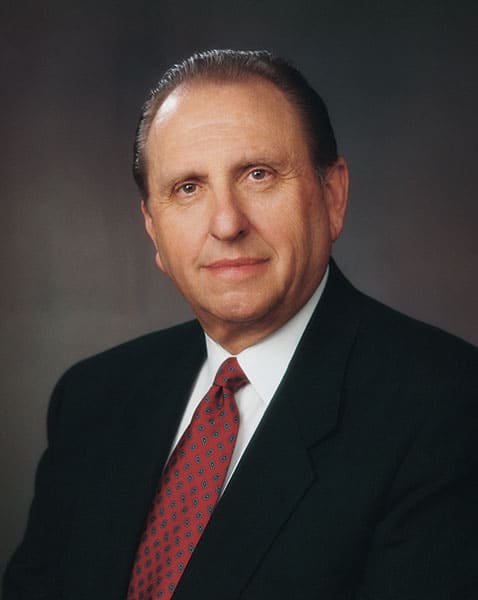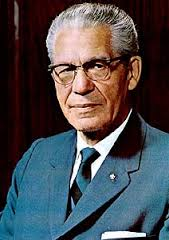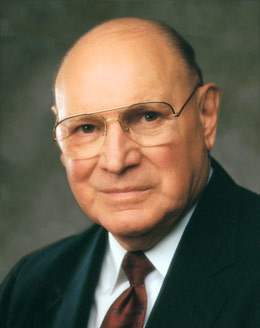SEARCH BY TITLE
 Be Strong and of Good Courage
Be Strong and of Good Courage
The call for courage comes constantly to each of us. Every day of our lives courage is needed—not just for the momentous events but more often as we make decisions or respond to circumstances around us. Said Scottish poet and novelist Robert Louis Stevenson: “Everyday courage has few witnesses. But yours is no less noble because no drum beats for you and no crowds shout your name.” Courage comes in many forms. Wrote the Christian author Charles Swindoll: “Courage is not limited to the battlefield … or bravely catching a thief in your house. The real tests of courage are much quieter. They are inner tests, like remaining faithful when no one’s looking, … like standing alone when you’re misunderstood.” I would add that this inner courage also includes doing the right thing even though we may be afraid, defending our beliefs at the risk of being ridiculed, and maintaining those beliefs even when threatened with a loss of friends or of social status. He who stands steadfastly for that which is right must risk becoming at times disapproved and unpopular. While serving in the United States Navy in World War II, I learned of brave deeds, instances of valor, and examples of courage. One which I shall never forget was the quiet courage of an 18-year-old seaman—not of our faith—who was not too proud to pray. Of 250 men in the company, he was the only one who each night knelt down by the side of his bunk, at times amidst the jeers of bullies and the jests of unbelievers. With bowed head, he prayed to God. He never wavered. He never faltered. He had courage. . . Brethren, are you the same person wherever you are and whatever you are doing—the person our Heavenly Father wants you to be and the person you know you should be?
 Integrity
Integrity
As I was talking to a man the other day, one of his employees passed by. My friend said, “There goes a man full of integrity. He has worked for my company for thirty years, and never at any time have I observed any thought or action of dishonesty or disloyalty. It gives a man a good feeling of confidence to have such an employee.” I have thought much about the word integrity since that day, as I often had before, and only wish that we and those with whom we deal would be completely honest and trustworthy, whether it be in matters pertaining to religion, science, economics, or local or national politics. Particularly in the home should integrity be taught and practiced as a basis for its extension into community life and all other phases of living. Aware of the need for a revival of this “old-fashioned” virtue, I concluded to address my remarks to this subject. Integrity, or the lack of it, touches almost every facet of our lives—everything we say, every thought and desire. From this very pulpit, and by some of the greatest religious leaders of modern time, we have heard sermons and exhortations upon honesty, trust, righteousness, dependability, truthfulness, kindness, justice, mercy, love, fidelity, and many other principles of right living. When one has integrated all of these attributes within his being, when they become the moving force of all his thoughts, actions, and desires, then he may be said to possess integrity, which has been defined as “a state or quality of being complete, undivided, or unbroken; moral soundness, honesty and uprightness.” Let us pursue this thought of a man being whole within himself, or undivided. Such a one would never find himself at war within himself as to which course to pursue or which decision to make. Constantly there would be a unity of purpose. There would not be, as someone has said, “one self for church, another self for business, another for recreation, home, travel, and so on.”
 Life’s Lessons Learned
Life’s Lessons Learned
Another lesson I learned on the football field was at the bottom of a pile of 10 other players. It was the Rocky Mountain Conference championship game, and the play called for me to run the ball up the middle to score the go-ahead touchdown. I took the handoff and plunged into the line. I knew I was close to the goal line, but I didn’t know how close. Although I was pinned at the bottom of the pile, I reached my fingers forward a couple of inches and I could feel it. The goal line was two inches away. At that moment I was tempted to push the ball forward. I could have done it. And when the refs finally pulled the players off the pile, I would have been a hero. No one would have ever known. I had dreamed of this moment from the time I was a boy. And it was right there within my reach. But then I remembered the words of my mother. “Joseph,” she had often said to me, “do what is right, no matter the consequence. Do what is right and things will turn out OK.” I wanted so desperately to score that touchdown. But more than being a hero in the eyes of my friends, I wanted to be a hero in the eyes of my mother. And so I left the ball where it was—two inches from the goal line. I didn’t know it at the time, but this was a defining experience. Had I moved the ball, I could have been a champion for a moment, but the reward of temporary glory would have carried with it too steep and too lasting a price. It would have engraved upon my conscience a scar that would have stayed with me the remainder of my life. I knew I must do what is right. The Light of Christ helps us to discern right from wrong. When we allow temptations to drown out the still voice of our conscience—that is when decisions become difficult.
 Personal Integrity
Personal Integrity
I have felt impressed to speak today about the need for integrity—old-fashioned, personal, practical integrity. To me, integrity means always doing what is right and good, regardless of the immediate consequences. It means being righteous from the very depth of our soul, not only in our actions but, more importantly, in our thoughts and in our hearts. Personal integrity implies such trustworthiness and incorruptibility that we are incapable of being false to a trust or covenant. . . The rewards of integrity are immeasurable. One is the indescribable inner peace and serenity that come from knowing we are doing what is right; another is an absence of the guilt and anxiety that accompany sin. Another reward of integrity is the confidence it can give us in approaching God. When virtue garnishes our thoughts unceasingly, our confidence is strong in the presence of God. When we are doing what is right, we will not feel timid and hesitant about seeking divine direction. We will know the Lord will answer our prayers and help us in our need. The consummate reward of integrity is the constant companionship of the Holy Ghost. The Holy Ghost does not attend us when we do evil. But when we do what is right, he can dwell with us and guide us in all we do. My brothers and sisters, let us live true to the trust the Lord has placed in us. Let us strive for personal, practical integrity in every endeavor, regardless of how mundane or inconsequential it may seem. The small matters accumulate to shape the direction of our lives.
